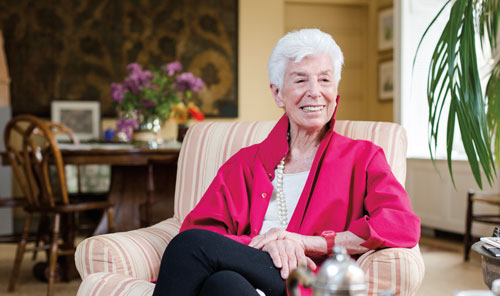Prizing Illustrated Books
Furthermore Rewards High Production Values with the Alice Award By Michele Filgate Michele Filgate is an essayist, critic, and freelance writer. She is a contributing editor at Literary Hub and VP/Awards for the National Book Critics Circle. Her work has appeared in Slice, The Paris Review Daily, Tin House, The Rumpus, Salon, and other publications.

Joan K. Davidson grew up with an appreciation for the arts. Her mother, Alice Manheim Kaplan, served on many boards and was president of the American Federation of the Arts for ten years. Her father, J. M. Kaplan, started the J. M. Kaplan Fund, a New York City–based philanthropic foundation. Davidson took over for her father in 1977, and served as the commissioner of the New York State Office of Parks, Recreation, and Historic Preservation. In the mid-1990s, she established Furthermore, “one of very few philanthropic programs that specifically support printed and illustrated books,” according to the web site.
“A big issue these days … is that the cost of reproductions has gotten extremely high,” said Ann Birckmayer, the administrator of Furthermore. “That means a book can go from having lots of illustrations to very few. So we hope that Furthermore will enable books to do things like that, have perhaps color instead of black and white, have more illustrations, maybe give the writer a bit of extra time for writing and research.”
Furthermore has distributed 1,075 grants over the past twenty years, ranging up to $15,000.
Then, three years ago, Davidson, who is 88, launched a new program named after her mother. Candidates for the Alice Award, which celebrates the book as a work of art, are selected from Furthermore grant recipients by a panel of esteemed jurors. The winning nonprofit institution receives $25,000.
The very first Alice Award went to the Brooklyn Museum for Youth and Beauty: Art of the American Twenties, and last year, the Whitney Museum of American Art received the honor for Hopper Drawing.
This year, the winner will be announced the week of October 15 and then fêted at the Frick Collection in New York City on October 27. The shortlist includes: Coney Island Visions of an American Dreamland, 1861–2008 (Wadsworth Atheneum Museum of Art in Hartford, Connecticut); Diego Rivera and Frida Kahlo in Detroit (Detroit Institute of Arts in Detroit, Michigan); The Open Road (Aperture, New York City); One Hundred Books Famous in Children’s Literature (Grolier Club, New York City); and A Portrait of Britain (National Portrait Gallery, London). The jurors include Michael Bierut of Pentagram, Paula Cooper of the Paula Cooper Gallery, the artist Maira Kalman, Gianfranco Monacelli of the Monacelli Press, and Jock Reynolds, director of the Yale University Art Gallery.
For Davidson, it’s important to look at the book as a whole.
“When you look around at book prizes, they mostly go to the contents of the book,” she said. “We do that, too, of course, but we consider the quality of the total book. All aspects of it have to be excellent—the idea, the editing, the design, the production. So it’s the book as an entire thing, the book as book, rather than the book just as a story of something. The book as book, which is a work of art in itself.”
Davidson said she understands the value of the e-book in the digital age, but she also appreciates the book as a physical object.
“We need a sense of the object in the hand,” she said. “There’s something so comforting in the physical experience of the book, the way it feels and looks and tastes and smells. There’s a kind of intimacy you have with it that you don’t have in quite the same way online. I don’t think it’s threatened, but I think we’re trying to make the case that we need both kinds. We need hip-hop music and jazz, but we also need Bach and Beethoven. One doesn’t replace the other. You need it all.”








